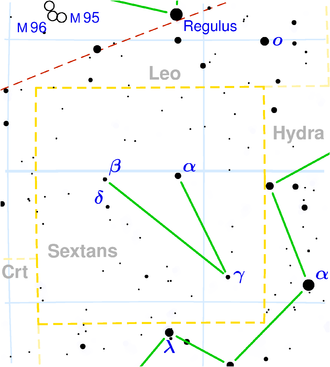NGC 3015
| Galaxy NGC 3015 |
|
|---|---|
![NGC 3015 & LEDA 213639 [1], SDSS image](https://upload.wikimedia.org/wikipedia/commons/thumb/8/8f/NGC3015_-_SDSS_DR14.jpg/300px-NGC3015_-_SDSS_DR14.jpg)
|
|
| NGC 3015 & LEDA 213639 , SDSS Recording | |
| AladinLite | |
| Constellation | sextant |
|
Position equinox : J2000.0 , epoch : J2000.0 |
|
| Right ascension | 09 h 49 m 22.9 s |
| declination | + 01 ° 08 ′ 44 ″ |
| Appearance | |
| Morphological type | SAB0 ^ 0 ^ / NLAGN |
| Brightness (visual) | 13.5 likes |
| Brightness (B-band) | 14.5 mag |
| Angular expansion | 0.5 ′ × 0.4 ′ |
| Position angle | 95 ° |
| Surface brightness | 11.6 mag / arcmin² |
| Physical data | |
| Affiliation | WBL 234 |
| Redshift | 0.025017 0.000073 |
| Radial velocity | (7500 ± 22) km / s |
|
Stroke distance v rad / H 0 |
(328 ± 23) x 10 6 ly (100.7 ± 7.1) Mpc |
| diameter | 45,000 ly |
| history | |
| discovery | Albert Marth |
| Discovery date | April 23, 1864 |
| Catalog names | |
| NGC 3015 • UGC 5261 • PGC 28240 • CGCG 007-041 • MCG + 00-25-020 • IRAS 09468 + 0122 • 2MASX J09492289 + 0108437 • GALEX ASC J094922.93 + 010842.8 | |
NGC 3015 is a lens-shaped galaxy with an active nucleus of the Hubble type S0 in the constellation Sextant in the southern sky . It is estimated to be 328 million light-years away from the Milky Way and has a diameter of about 45,000 ly
. a. the galaxies NGC 3018 and NGC 3023 .
The object was discovered by Albert Marth on April 23, 1864 .
